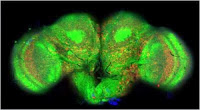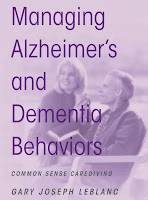
Sundowning: Is My Body Clock Broken or Just Disconnected?
Early-evening restlessness and agitation, known as ‘sundowning’, is common in Alzheimer’s. So is fragmented sleep. A major discovery indicates these symptoms are curable.

Early-evening restlessness and agitation, known as ‘sundowning’, is common in Alzheimer’s. So is fragmented sleep. A major discovery indicates these symptoms are curable.

AGITATION & ANXIETY IN ALZHEIMER’S: Get these tips for coping with “sundowning”. (Sundowning is restlessness or agitation in the late afternoon or early evening in

FASCINATING VIDEO + ARTICLE: Learn how people with Alzheimer’s have better cognition skills in the late summer and early fall. Find out how seasonality affects

BOOK OF THE WEEK: Here’s a short, easy-to-read primer on caring for and talking with difficult people who have dementia. It is written by the

Lewy Body dementia is the 2nd most common form of dementia. See
experts at America’s top medical center, The Mayo Clinic, improving the lives of people who struggle with it.

We make a living by what we get,But we make a life by what we give. (Winston Churchill)

Clinical Psychology / Neuropsychology
LIFECARE PSYCHOLOGY GROUP, LLC

SHORT-TERM MEMORY lapses are obvious signs of Alzheimer’s, but other tell-tale signals begin to show much earlier. Learn how to look for semantic impairments, such as simple questions about size.

Three important dementia studies focus on HS-AGING, a type of dementia almost as common as Alzheimer’s in the 85+ group. Yet few people have heard of it. Why? What makes it different?

An intriguing study of 120 grandmothers might surprise you. Doctors know socially engaged people have better cognition and less dementia. But can a person get too much of a good thing? What’s the right balance?

Enjoy this great duet between a musician with dementia and his son. A triumph of spirit over Alzheimer’s! Sing-a-long if you like!
No spam, only news and updates.


